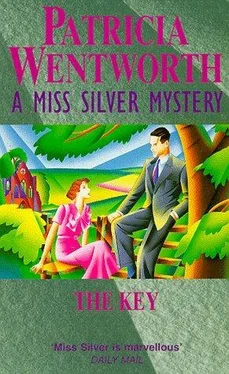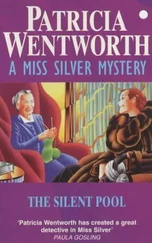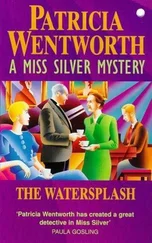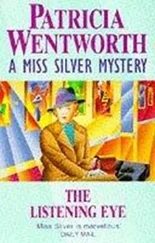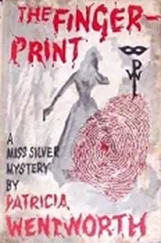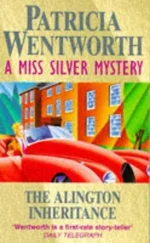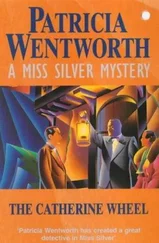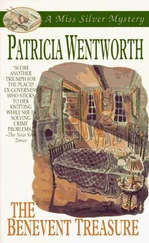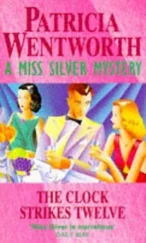
Patricia Wentworth
The Key
Miss Silver – #08, 1944
THERE ARE TRAFFIC lights in the middle of Marbury where its two main roads cross. Michael Harsch came up to the edge of the pavement and saw the orange light go on. Having lived the greater part of his life under German rule, he made no attempt to cross before the red, but stood waiting patiently just where he was until the lights should change.
Of the two roads, one runs as straight as a ruled line, set with pompous examples of Victorian shop architecture. The other comes sidling in on a crooked curve and shows an odd medley of houses, shops, offices, with a church and a filling-station to break the line. Some of the houses were there when the Armada broke. Some of them have put on new pretentious fronts. Some of them are no better than they should be from a cheap builder’s estimate. Taken as a whole, Ramford Street has a certain charm and individuality which the High Street lacks.
Michael Harsch, waiting for the lights, looked idly down the irregular line of houses – a tall, narrow one running up to four storeys with a dormer window in the roof; the square front of a shabby hotel with its sign of the Ram swinging tarnished just over the heads of the passers-by; farther on a little squat, two-storied house with its old woodwork painted emerald green, and over the door in gold letters two foot high, the word Teas .
He turned back to the traffic lights, and found them green too. If he had crossed then, a great many things might have happened differently. Yet the moment came and went without anything to mark it out from other moments. His mind was divided between the purpose which had brought him to the crossing and the realisation that he was tired and thirsty, and that a cup of tea would be pleasant. If he crossed now, he would get the four-forty-five to Perry’s Halt and catch the bus to Bourne. If he waited to have some tea, he would miss his train and the bus, and be late for supper, because he would have to walk across the fields from the Halt. He hesitated, and as he did so the lights changed again. He turned his back on the crossing and made his way down Ramford Street.
He had without knowing it taken the most momentous decision of his life. Because green changed to orange at just that time three people were to die, and the lives of four others were to be deeply and radically altered. Yet there was nothing in his mind to warn him of this. And perhaps – who knows? – a warning would have made no difference.
He went a little way down the street and crossed over. Here again there was a decision to be made, but this time it hardly cost him a thought. The little green teashop had put the idea of tea into his mind, but it had no attractions for him. He went up three steps, crossed a tesselated space, and entered the dark, narrow hall of the Ram. Nothing more inconvenient could have been devised. There was a staircase, there was a booking-office. There were two barometers, three cases of stuffed fish, and the grinning mask of a fox. There was a grandfather clock with a gloomy face and a hollow tick, there was a marble-topped table like a wash-stand with gilt legs which supported a pining aspidistra in a bright pink pot. There was an enormous umbrella-stand, and a small oak chest. There was no light, and a smaller amount of fresh air than one would have believed possible. A smell of beer, damp mackintoshes, and mould appeared to be indigenous. It had a bouquet and a richness not to be attained in less than fifty years.
There were six doors. Above one of them were the words Coffee Room . As Harsch approached, this door opened and a man came out. The room was lighter than the hall. The light fell slanting past an ear, a cheekbone, a tweed-covered shoulder, and struck full upon the face of Michael Harsch. If the man who was coming out of the coffee-room checked, it was no more than anyone might have done to avoid colliding with a stranger. He certainly did not draw back, and before a breath could be taken he had gone past and was absorbed into the gloom.
Michael Harsch stood still. He thought he had seen a ghost, but he was not sure. You have to be very sure indeed before you speak about a thing like that. He had had a shock, and he was not sure. He stood looking into the room but not seeing it. Presently he turned and walked back into Ramford Street. When he got there he stood and looked about him, up the street and down. There was no one in sight whom he had ever seen before. Ghosts don’t walk in the day. He told himself that he had been mistaken, or that his nerves had played him a trick. He had been overworking – it was a trick of the nerves, a trick of the light – light slanting like that plays tricks. There were too many things in his mind, in his memory, waiting for just such a chance to give them the illusion of a present instead of a past reality.
When he had satisfied himself that there was no one in sight he began to walk back towards the traffic lights. He had forgotten that he was tired and thirsty. He had forgotten why he had gone into the Ram. He thought only of getting away from Marbury, of catching his train. But he had lost too much time, when he reached the station the train was gone. He had an hour and a half to wait, and the long walk over the fields at the other end. Supper would be over before he got home. But Miss Madoc was so kind – she would see that something was kept hot for him. He filled his mind with these everyday trifles in order to steady it.
When he had crossed the road and was at a safe distance, a man in a tweed coat and a pair of grey flannel trousers came out of the little newspaper and tobacco shop next door to the Ram. He looked exactly like dozens of middle-aged men in country places. He went back into the hotel with an evening paper in his hand. To all whom it might concern he had just stepped out to buy it. He went back into the coffee-room and shut the door. The only other occupant looked over the top of a cheap picture paper and said, ‘Did he recognise you?’
‘I don’t know. I think he did, but afterwards he wasn’t sure. I went into the tobacconists and watched him through the window. He looked up and down, and then, when he saw no one, he wasn’t sure – I could see it in his face. He didn’t see you, did he?’
‘I don’t think so – I had my paper up.’
The man in the tweed coat said, ‘Wait a minute! When you get back you can find out what is on his mind about me. He’s had a shock, he is doubtful, but you must find out what is the state of his mind when the shock has passed. If he is dangerous, steps must be taken at once. In any case it is very nearly time, but if it is possible without too much risk he should be allowed to complete his experiments. I leave it to you.’
Michael Harsch sat on a bench at Marbury station and waited for his train. His mind felt bruised and incapable of thought. He was very tired.
MICHAEL HARSCH CAME out of the hut in which he had been working and stood looking down the tilted field to the house at Prior’s End. Because the work on which he was engaged was dangerous, and there was always present the possibility that it might end itself and him quite suddenly in a puff of smoke, the house was nearly quarter of a mile away. The hut was long and low, a shabby-looking affair roughly creosoted to withstand the weather, but the door through which he had come was a very solid one, and the line of windows not only carried bars but were secured inside by strong and heavy shutters.
He turned to lock the door behind him, pocketed the key, and then stood again as he had done before, looking out past the house to the lane which followed the slope, and the line of willows which marked the trickling course of the Bourne. The village of Bourne was out of sight, all except the top of the square church tower. On a fine day the weathercock glinted in the sun. But there was no sun tonight. Dark hurrying clouds overhead where a wind blew – high up, unfelt below. Strange to see the clouds drive when not a leaf was stirring in the hedgerow or among the willows.
Читать дальше
